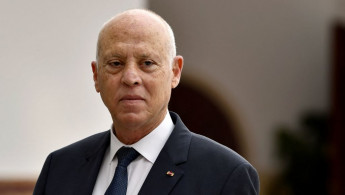Tunisia: Key opposition group urges 'national salvation government'
A key Tunisian opposition group on Saturday urged that a "national salvation government" be created, amid a continued crackdown by authorities.
The National Salvation Front (NSF) bloc issued a statement saying the current government was "breaching the state's duty to provide basic goods" and using violence against "social protests", Turkish news agency Anadolu reported.
"The coup authority does not have any economic policy but to hike prices and freeze recruitment," the statement said.
The NSF said President Kais Saied, who launched a power grab in July 2021, "has no other goal except gathering all powers in his hands".
Islamist party Ennahda, which had more seats in parliament than any other party before Saied suspended and later dissolved it, is part of the NSF. Other members of the NSF include Heart of Tunisia and the Dignity Coalition, also major political forces.
Tunisia has been engulfed in political chaos since Saied dissolved parliament, although he insists his actions sought to rescue the country from economic and political deadlock. His opponents say he carried out a "coup".
Tunisia's economy remains seriously struggling, and the country has faced protests and strikes.
The North African nation will soon enact difficult economic reforms that have been delayed for years, the central bank governor said late last month, adding that financial authorities were trying to keep the dinar currency stable.
The return of Tunisia's police state
— The New Arab (@The_NewArab) October 29, 2022
✍ @AlessandraBajec https://t.co/OudTYINcR5
In October, Tunisia reached a preliminary agreement with the International Monetary Fund (IMF) for a much-needed $1.9-billion rescue package that could be finalised in December.
The deal with the IMF is also critical to unlocking bilateral aid from donor countries that want assurances from Tunisia it will put its finances on a more sustainable footing.
Reuters contributed to this report.





 Follow the Middle East's top stories in English at The New Arab on Google News
Follow the Middle East's top stories in English at The New Arab on Google News
![Netanyahu furiously denounced the ICC [Getty]](/sites/default/files/styles/image_330x185/public/2024-11/GettyImages-2169352575.jpg?h=199d8c1f&itok=-vRiruf5)
![Both Hamas and the Palestinian Authority welcomed the ICC arrest warrants [Getty]](/sites/default/files/styles/image_330x185/public/2024-11/GettyImages-2178351173.jpg?h=199d8c1f&itok=TV858iVg)
